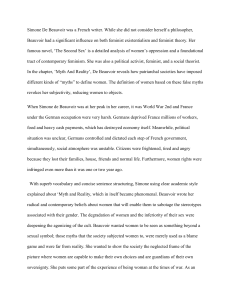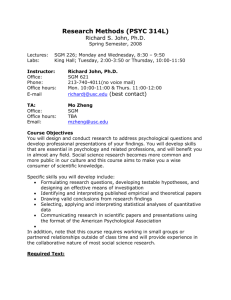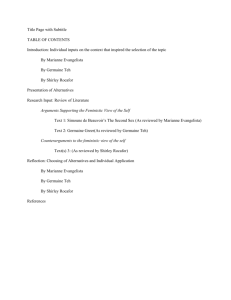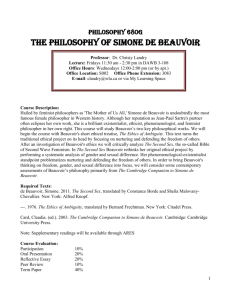HU_6060 - Michigan Technological University
advertisement
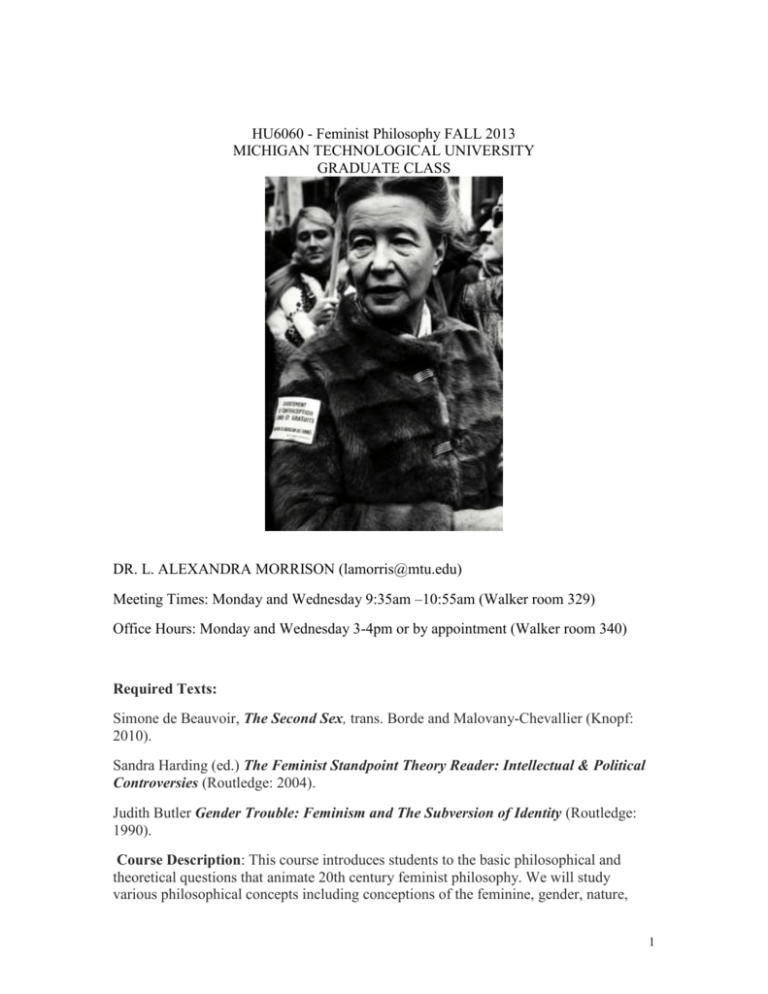
HU6060 - Feminist Philosophy FALL 2013 MICHIGAN TECHNOLOGICAL UNIVERSITY GRADUATE CLASS DR. L. ALEXANDRA MORRISON (lamorris@mtu.edu) Meeting Times: Monday and Wednesday 9:35am –10:55am (Walker room 329) Office Hours: Monday and Wednesday 3-4pm or by appointment (Walker room 340) Required Texts: Simone de Beauvoir, The Second Sex, trans. Borde and Malovany-Chevallier (Knopf: 2010). Sandra Harding (ed.) The Feminist Standpoint Theory Reader: Intellectual & Political Controversies (Routledge: 2004). Judith Butler Gender Trouble: Feminism and The Subversion of Identity (Routledge: 1990). Course Description: This course introduces students to the basic philosophical and theoretical questions that animate 20th century feminist philosophy. We will study various philosophical concepts including conceptions of the feminine, gender, nature, 1 embodiment, situatedness and alterity. The various philosophical and theoretical frameworks in which these concepts are utilized provide the necessary context for adequately grasping these concepts. For example, in order to understand the main arguments that feminist philosophers employ in their arguments for equality and recognition of difference, students need to have a sufficient comprehension of Psychoanalysis, Historical Materialism, Phenomenology and Existential Thought. To this end we will read selected primary texts of Sigmund Freud, Karl Marx, Friedrich Engels, Jacques Lacan, Martin Heidegger and Michel Foucault. In addition to reading the most influential 20thC Feminist text, Beauvoir’s The Second Sex, we will also engage with the works of Hélène Cixous, Luce Irigaray, Sarah Kofman, Julia Kristeva, Donna Haraway, Sandra Harding, bell hooks and Judith Butler. Course Goals: This course is meant to contribute to the students’ comprehension of philosophy and feminist thought. Through readings, class discussions, and writing assignments students will develop a complex understanding of the major concepts and critiques in feminist thought; understand the breadth, depth, and variety of feminist thought; critically evaluate theoretical assumptions and learn to confidently engage with the complex metaphysical and epistemological foundations of theoretical work in any domain. COURSE REQUIREMENTS: You will be asked to lead one philosophical discussion, submit questions before each class meeting (except for the first class meeting), prepare a paper abstract and an annotated bibliography, and submit a (conference length) final paper. Since this is a graduate level seminar class which you must carefully read the materials and be prepared to discuss them with appropriate level of rigor and attention to detail. ONLINE LEARNING SYSTEM: We will use Canvas for this course. I will upload assignments as well as readings to the system. You can access Canvas at https://mtu.instructure.com/ GRADE BREAKDOWN: Discussion Leadership/Presentation: 10% Reading Questions: 20% Abstract and Annotated Bibliography: 20% Final Paper: 40% Attendance and participation: 10% Total: 100% 2 Tentative Reading Schedule WEEK 1: INTRODUCTION TO THE TOPIC Wed. Sept. 4: Simone de Beauvoir, The Second Sex, Introduction pp. 3-17 *Butler, “Sex and Gender in Simone de Beauvoir’s Second Sex” p. 35-37 (posted in Modules) WEEK 2: CHALLENGING BIOLOGICAL REDUCTIONISM & FREUDIANISM and FEMINISM Mon. Sept. 9: Simone de Beauvoir, The Second Sex, Chapter 1: Biological Data pp. 21-48. *The Biology and Gender Study Group, “The Importance of Feminist Critique for Contemporary Cell Biology” pp. 63-73 (posted in Modules) Wed. Sept. 11: Simone de Beauvoir, The Second Sex, Chapter 2: The Psychoanalytical Point of View pp. 49-61 *Sigmund Freud, “Femininity” pp. 1-11 (posted in Modules) WEEK 3: FREUDIANISM and FEMINISM Mon. Sept 16: J. Russon, “The Bodily Unconscious in Freud’s ‘Three Essays’” pp. 35-49 (posted in Modules) * Toril Moi, “From Femininity to Finitude: Freud, Lacan and Feminism, Again” pp. 841875 (posted in Modules) Wed. Sept. 18: Sarah Kofman “Woman in Freud’s Writings” pp. 159-186 (posted in Modules) WEEK 4: BEAUVOIR’S CRITIQUE OF HISTORICAL MATERIALISM AVERTED? Mon. Sept. 23 – Karl Marx, The German Ideology pp. 1-14 (an excerpt posted in modules) Wed. Sept. 25 – Simone de Beauvoir, The Second Sex Chapter 3: “The Point of View of Historical Materialism” pp. 62-68 *Martha Gimenez, “The Oppression of Women” pp. 71-82 (posted in Modules) * Nancy Hartsock “The Feminist Standpoint: Developing the Ground for a Specifically Feminist Historical Materialism” in The Feminist Standpoint Theory Reader pp. 35-50 3 WEEK 5: BEING-IN-THE-WORLD-BEING-WITH or “STANDPOINT THEORY” Mon. Sept. 30 – Martin Heidegger, Being and Time, Part 1, Division 1, IV: The Worldhood of the World pp. 91-95 and Being-in-the-World as Being-With and BeingOne’s-Self. The- ‘They’ pp. 149-168 and sections on “Mood” pp. 172-179 and Angst pp. 228-235 (posted in Modules) Wed. Oct. 2 – Sandra Harding, “Re-thinking Standpoint Epistemology: What is “Strong Objectivity”? in The Feminist Standpoint Theory Reader, pp. 127-140. WEEK 6 – THE SITUATION OF WOMEN Mon. Oct. 7 – Simone de Beauvoir, The Second Sex, Volume II Lived Experience, Introduction and Chapter 1: Childhood pp. 283-304 and The Girl p. 341-352 and Sexual Initiation pp. 383-391 Wed. Oct. 9 – bell hooks, “Ain’t I a Woman?” (posted in Modules) WEEK 7 – THE CONTINUING INFLUENCE OF PHENOMENO-EXISTENTIAL THOUGHT Mon. Oct. 14 – Simone de Beauvoir, The Second Sex, Conclusion pp. 753-766 *bell hooks “Choosing the Margin as A Space of Radical Openness” in The Feminist Standpoint Theory Reader, pp. 153-159 Wed. Oct. 16 – tba PRESENTATION DATES AND TOPICS/READINGS SHOULD BE ESTABLISHED BY THIS DATE. WEEK 8- WHAT’S THE TROUBLE? Mon. Oct. 21 – Judith Butler, Gender Trouble, preface vii-xxxvi and Chapter 1 pp. 1-22 Wed. Oct. 23 –Judith Butler, Gender Trouble, Chapter 1 pp. 22-46 WEEK 9 – POLICING EMBODIMENT Mon. Oct. 28 -- Michel Foucault, “Panopticism” pp. 264-277 (posted) *Selections from Lacan - tba 4 Wed. Oct. 30 – Judith Butler, Gender Trouble, Chapter 2 pp. 47-77 WEEK 10 – TRANSFORMING IDENTITIES Mon. Nov. 4 Judith Butler, Gender Trouble, Chapter 3 pp. 107-150 Wed. Nov. 6 Judith Butler, Gender Trouble, Chapter 3 pp. 151-204 *Please note: The readings for the final four weeks of class will be determined by the students themselves in consultation with the professor. These will be decided by the end of week 7 and will be posted on CANVAS at that time. Detailed directions will be provided in class. WEEK 11 Mon. Nov. 11 – Presentation 1 Wed. Nov. 13 – Presentation 2 WEEK 12 Mon. Nov. 18 – Presentation 3 Wed. Nov. 20 – Presentation 4 Mon. Nov. 25, Wed. Nov. 27, Fri. Nov. 29 – Thanksgiving Break WEEK 14 Mon. Dec. 2 – Presentation 5 Wed. Dec. 4 – Presentation 6 WEEK 15 Mon. Dec. 9 – Presentation 7 Wed. Dec. 11 – Presentation 8 GRADING SYSTEM 5 Letter Grad e A AB B BC C CD D F I X Grade Percentage points/credit Rating 93% & above 4.00 Excellent 87% – 92% 3.50 Very good 82% – 86% 3.00 Good 76% – 81% 2.50 Above average 70% – 75% 2.00 Average 65% – 69% 1.50 Below average 60% - 64% 1.00 Inferior 59% and below 0.00 Failure Incomplete; given only when a student is unable to complete a segment of the course because of circumstances beyond the student’s control. A grade of incomplete may be given only when approved in writing by the department chair or school dean. Conditional, with no grade points per credit; given only when the student is at fault in failing to complete a minor segment of a course, but in the judgment of the instructor does not need to repeat the course. It must be made up within the next semester in residence or the grade becomes a failure (F). A (X) grade is computed into the grade point average as a (F) grade. **LATE PAPERS will result in a drop in a letter grade. **Plagiarism is not tolerated and will result in failing the course. Consult the University rules and guidelines regarding this serious breach of ethics. However, please note that all materials used in the construction of your written work (notes, outlines, rough drafts, etc.) should be saved until you have received a passing grade from me. University Policies: Academic regulations and procedures are governed by University policy. Academic dishonesty cases will be handled in accordance with the University's policies. For more information on this serious breach of conduct, see: http://www.studentaffairs.mtu.edu/dean/judicial/policies/academic_integrity.html If you have a disability that could affect your performance in this class or that requires an accommodation under the Americans with Disabilities Act, please see me as soon as possible so that we can make appropriate arrangements. The Affirmative Action Office has asked that you be made aware of the following: Michigan Tech complies with all federal and state laws and regulations regarding discrimination, including the Americans with Disabilities Act of 1990. If you have a disability and need a reasonable accommodation for equal access to education or services at Michigan Tech, please call the Dean of Students Office, at 487-2212. For other concerns about discrimination, you may contact your advisor, department head or the Affirmative Action Office, at 487-3310 6 For more information on these policies, see: Affirmative Action: http://www.admin.mtu.edu/aao/ Disability Services: http://www.admin.mtu.edu/urel/studenthandbook/student_services.html#disability Eq ual Opportunity Statement: http://www.admin.mtu.edu/admin/boc/policy/ch3/ch3p7.htm 7


